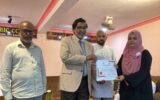
KHALIDH RIZWAN
COLOMBO
Every year on December 18th, millions around the globe unite to celebrate the World Arabic Language Day, a momentous occasion dedicated to one of the world’s richest and most influential languages. Arabic, spoken by over 400 million people across 25 countries, is not merely a language; it is a cornerstone of culture, heritage, and intellectual achievement that transcends borders.
The Legacy of Arabic
Arabic stands as a testament to the profound human ability to communicate beauty, knowledge, and spirituality. From the eloquent poetry of pre-Islamic Arabia to the intricate calligraphy that adorns mosques, Arabic has been a vessel of artistic expression for centuries.
Moreover, Arabic played a pivotal role in the Golden Age of Islam, serving as the lingua franca of science, philosophy, and literature. Scholars such as Al-Farabi, Ibn Sina (Avicenna), and Al-Khwarizmi penned groundbreaking works in Arabic, influencing disciplines ranging from medicine to mathematics.
The Kingdom of Saudi Arabia: A Global Leader in Arabic Preservation
The Kingdom of Saudi Arabia holds a distinguished position in developing and safeguarding the Arabic language. As the birthplace of Islam and the custodian of the Two Holy Mosques, Saudi Arabia plays a critical role in preserving Arabic’s spiritual and cultural essence.
Through several landmark initiatives, Saudi Arabia has solidified its reputation as a global leader in promoting the Arabic language:
King Salman Global Center for Arabic Language:
This center serves as a hub for Arabic language preservation and development. It fosters academic research, supports Arabic language education worldwide, and organizes cultural programs aimed at promoting Arabic literature and arts.
The Prince Mohammed Bin Salman Project for the Arabic Language:
This ambitious project focuses on advancing Arabic language studies through digital platforms, artificial intelligence, and modern teaching methods. It has supported various initiatives, including Arabic e-learning programs and specialized language courses for non-native speakers.
Establishment of Arabic Chairs in International Universities:
Saudi Arabia has sponsored Arabic language chairs at prestigious universities, including Oxford University, Beijing University, and the University of Moscow. These academic positions are dedicated to teaching and researching Arabic language and literature, ensuring its global dissemination.
Annual King Faisal International Prize for Arabic Language and Literature:
This prestigious award recognizes individuals and institutions that have made outstanding contributions to Arabic linguistics, literature, and preservation. It underscores the Kingdom’s commitment to celebrating and rewarding excellence in Arabic studies.
Efforts in Artificial Intelligence and Technology:
Saudi Arabia has spearheaded initiatives to integrate Arabic into artificial intelligence applications, digital translation tools, and social media platforms. The country has collaborated with global tech companies to ensure Arabic remains accessible and relevant in the digital age.
Cultural Festivals and Competitions:
Saudi Arabia hosts numerous Arabic poetry festivals, calligraphy competitions, and literary events that attract participants from across the Arab world. Events like the Riyadh International Book Fair and the Okaz Souk Festival showcase the richness of the Arabic language and its cultural heritage.
Support for Quranic Arabic:
Saudi Arabia’s efforts to preserve Quranic Arabic are unparalleled. The Kingdom funds Quran printing and distribution worldwide, and it has established institutes dedicated to teaching Quranic Arabic to non-native speakers.
Arabic in the Modern World
In contemporary times, Arabic continues to thrive as one of the six official languages of the United Nations, underscoring its global significance. With the rise of digital media and technology, Arabic has adapted to new modes of communication while retaining its traditional elegance.
Furthermore, the preservation of Arabic is vital in understanding the Quran and Islamic teachings, which resonate with over 1.9 billion Muslims worldwide. Its linguistic depth and diversity—encompassing numerous dialects and Modern Standard Arabic—enrich global communication and cultural exchange.
Challenges and Opportunities
Despite its grandeur, the Arabic language faces challenges, including linguistic uniformity in education and the dominance of global languages like English. However, these challenges present opportunities for revitalization. Efforts like those championed by Saudi Arabia to integrate Arabic into technology, expand its digital footprint, and promote its use in education and media have been gaining momentum.
Why Celebrate Arabic?
World Arabic Language Day is not just a celebration of words; it is a tribute to the cultural and intellectual legacy of Arab civilization. It reminds the world of the pivotal role Arabic has played in shaping human progress and fosters a sense of pride and identity among Arabic speakers.
A Global Language of Unity
In an increasingly interconnected world, the Arabic language serves as a bridge that connects diverse cultures. Its poetic charm, historical significance, and intellectual depth make it a language worth cherishing, preserving, and promoting.
On this World Arabic Language Day, let us honor this timeless language and recognize the tireless efforts of nations like Saudi Arabia that work to protect and promote its legacy. Together, we ensure that Arabic remains a beacon of culture, resilience, and unity in the global community.
















